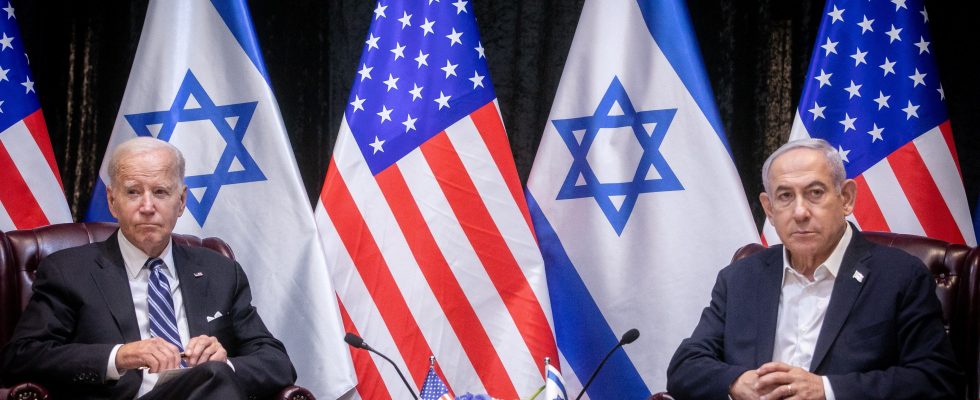Between Washington and Tel Aviv, tensions are increasing. For several weeks, the American administration has not been shy of criticism of Benjamin Netanyahu in his conduct of the war in Gaza. Sermons that the Israeli Prime Minister has little taste for. The latter did not hesitate to reaffirm his intention to launch an offensive on Rafah, while Joe Biden urged Israel not to attack this city in southern Gaza.
But this Monday, March 25, a high point in this escalation of tensions seems to have been reached: by abstaining in the United Nations Security Council, the United States allowed the adoption of a resolution demanding a “cease -immediate fire”. A first, which constitutes a major turning point in American diplomacy, whose support for Israel until then appeared flawless. A look back at the last twenty-four hours which catalyzed the dissensions between the two historic allies.
Act I: Washington abstains
This Monday, March 25, the fifteen elected members of the Security Council met at the headquarters of the United Nations (UN) in New York. On the agenda is a resolution calling for an immediate humanitarian ceasefire in the Gaza Strip. The tenth since the attack on October 7 which sparked the conflict between Israel and Hamas.
The text, which was put to the vote, includes three demands: “an immediate ceasefire during the month of Ramadan which is respected by all parties and leads to a lasting ceasefire”, the “immediate release and unconditional protection of all hostages and the guarantee of humanitarian access to meet their medical and other humanitarian needs” and the respect by each party of the obligations imposed on them by international law with regard to those detained.
This text receives almost unanimity. The United States abstains, with Washington demanding a more explicit condemnation of Hamas. Because if the terrorist organization had accepted the release of the hostages, a ceasefire could have occurred “months ago”, argued the Ambassador and Permanent Representative of the United States, Linda Thomas-Greenfield at the the outcome of the vote.
Act II: cancellation of the Israeli delegation’s visit to Washington
The fact remains that by abstaining, the United States ultimately allowed the adoption of a resolution calling for a ceasefire without delay. A 180-degree diplomatic turn for this historic ally of Israel which had until now opposed any plan to stop the fighting in the Gaza Strip. Like last February 20, when they vetoed a similar text.
Furious, Benjamin Netanyahu decides to immediately cancel the sending of an Israeli delegation expected this week to Washington. His emissaries and closest collaborators, Ron Dermer and Tzachi Hanegbi, were to discuss the large-scale offensive planned in Rafah, which the White House opposes.
In total break with “the position of the United States since the start of the war”, Washington’s decision taken this Monday “harms the war efforts and the efforts aimed at freeing the hostages”, criticized at the end of the day the first Israeli minister. Benyamin Netanyahu fears in particular that such a resolution will “give Hamas hope that international pressure will allow them to obtain a ceasefire without releasing (the) hostages”.
Act III: “No Change of Course” in Washington
In response, the United States said it was “very disappointed” by the cancellation of a visit which would have allowed “to have an in-depth conversation about credible alternatives to a ground operation in Rafah”, argued the spokesperson. National Security Council spokesman John Kirby Monday evening. And to suggest that “the services of the Prime Minister (Israeli, Editor’s note) are seeking to create the impression of a divergence” between the two allies.
Enough to forget the recent media outings of Joe Biden, who in recent weeks has increased his condemnations of the Israeli offensive in Gaza. To the point of asserting on March 10 that Benjamin Netanyahu is doing “more harm than good to Israel”. But this Monday, the United States assures us: the United States’ abstention “does not represent a change of course.”
Torn between the concern to preserve his historic ally and the need to maintain a distance from the supremacist ministers in Netanyahu’s entourage while he is in the middle of the race for the presidential election in the United States, Joe Biden is walking on eggshells in the Middle East.
